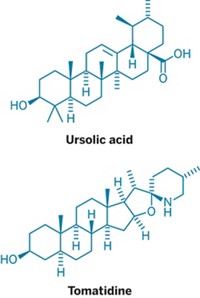Advertisement
Grab your lab coat. Let's get started
Welcome!
Welcome!
Create an account below to get 6 C&EN articles per month, receive newsletters and more - all free.
It seems this is your first time logging in online. Please enter the following information to continue.
As an ACS member you automatically get access to this site. All we need is few more details to create your reading experience.
Not you? Sign in with a different account.
Not you? Sign in with a different account.
ERROR 1
ERROR 1
ERROR 2
ERROR 2
ERROR 2
ERROR 2
ERROR 2
Password and Confirm password must match.
If you have an ACS member number, please enter it here so we can link this account to your membership. (optional)
ERROR 2
ACS values your privacy. By submitting your information, you are gaining access to C&EN and subscribing to our weekly newsletter. We use the information you provide to make your reading experience better, and we will never sell your data to third party members.
Biological Chemistry
Diet and microbiome conspire to modify epigenetics
Short-chain fatty acids produced by the mouse microbiome in response to diet alter acetylation and methylation on histone proteins
by Sarah Everts
November 27, 2016
| A version of this story appeared in
Volume 94, Issue 47
Over the past decade, scientists studying the human microbiome have found that the microorganisms inhabiting our bodies can influence our propensity for obesity, cardiovascular disease, diabetes, inflammatory bowel disease, and many other ailments. Although the precise mechanisms by which our microbiome alters our health—for good and bad—have mostly eluded researchers, many increasingly believe that the short-chain fatty acids produced by our microbes, including acetate, propionate, and butyrate, are likely involved.
Now a team of researchers led by Federico E. Rey and John M. Denu at the University of Wisconsin, Madison, reports that short-chain fatty acids produced by a mouse’s gut microbiome can affect the epigenetics in the animal’s cells: The compounds change the activity of enzymes that help add acetyl and methyl groups to histone proteins, thereby altering the availability of nearby DNA for transcription (Mol. Cell. 2016, DOI: 10.1016/j.molcel.2016.10.025). Although they found a direct connection between short-chain fatty acids and histone acetylation, the connection with histone methylation was less straightforward, suggesting that other microbiome metabolites are likely involved in modifying mouse epigenetics.
Furthermore, the team found that feeding mice a high-fat Western diet suppressed production of short-chain fatty acids by their gut microbes as well as the epigenetic modifications that would normally occur with a healthier fiber-rich diet.





Join the conversation
Contact the reporter
Submit a Letter to the Editor for publication
Engage with us on Twitter